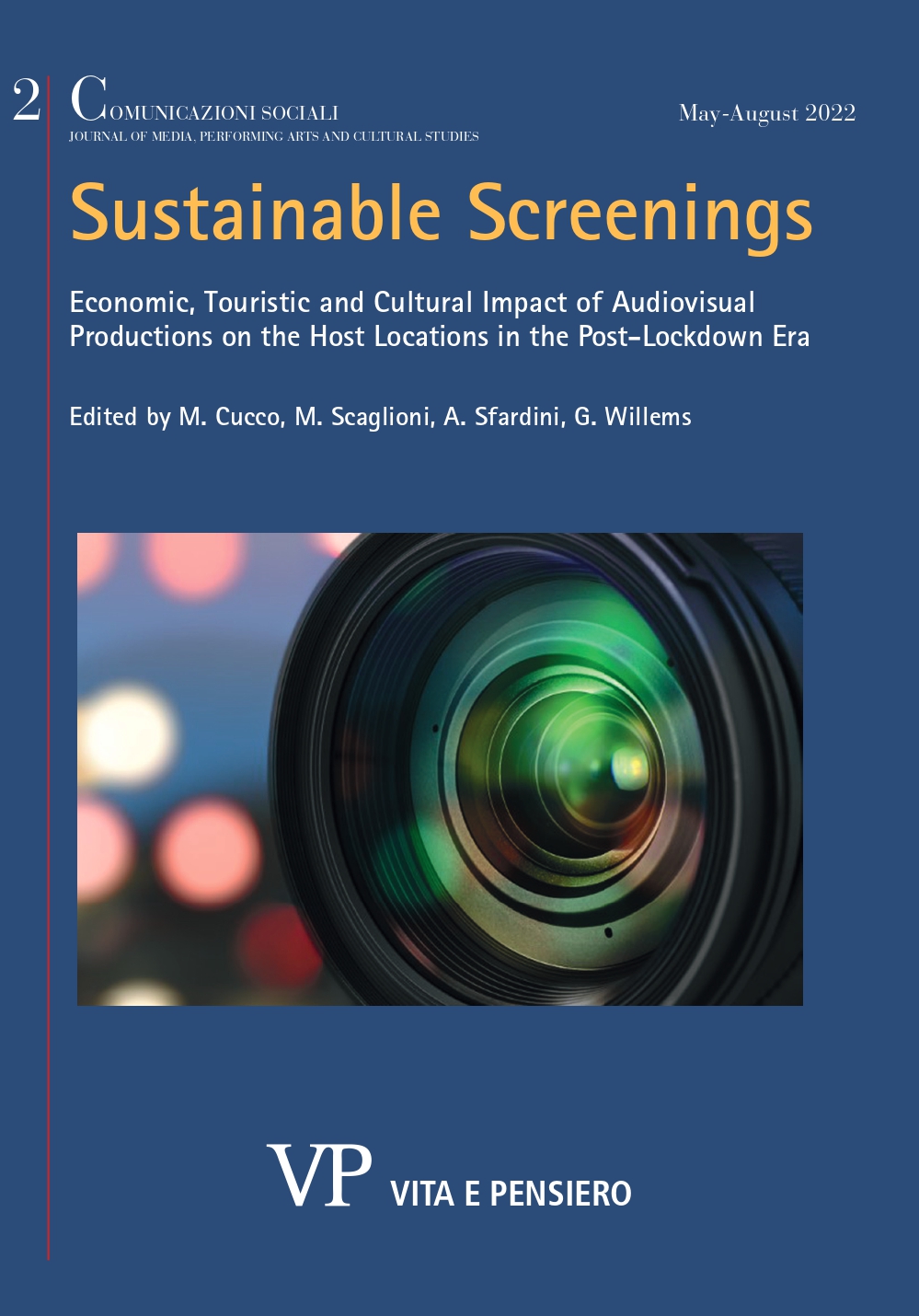- Milano
- Centro di Ricerca sulla Televisione e gli Audiovisivi (Ce.R.T.A.)
- Notizie
- SUSTAINABLE SCREENINGS. Economic, touristic and cultural impact of audiovisual productions on the host locations in the post-lockdown era
SUSTAINABLE SCREENINGS. Economic, touristic and cultural impact of audiovisual productions on the host locations in the post-lockdown era
We are pleased to announce that CS JOURNAL - Comunicazioni Sociali has published its latest monographic issue, Sustainable Screenings: Economic, Touristic and Cultural Impact of Audiovisual Productions on the Host Locations in the Post-Lockdown Era, edited by Massimo Scaglioni, Anna Sfardini, Marco Cucco and Gertjan Willems.
In the last twenty years, the relationship between media production and places has been a key topic in the field of media studies. Despite that, in the post-lockdown world this relationship still needs to be properly investigated since nowadays it embodies new meanings that invite media scholars to redefine their understanding of how media may serve and/or impact places and vice versa.
It is widely known that film and audiovisual shoots can have a positive impact on the host location economy: more tax revenues, new employment and facilities, etc. Sometimes, film and audiovisual products stimulate tourism too, which implies once again economic benefits. In both cases, they feed local pride and contribute to re-define the image and status of the host places. In the framework of the post-pandemic recovery, these two capabilities are receiving even more attention than in the past: tourism, for instance, was one of the sectors that suffered most due to the health emergency, and its relaunch is at the top of the agenda of many public institutions. Thus, the current scenario moves film and audiovisual production at the center of the action plans for the post-pandemic economy and society. However, all the current recovery policies base themselves on the concept of sustainability, and this raises the question how film and audiovisual production meet the concept of sustainability.
In the (post-)pandemic world, the capability of film and audiovisual production to serve places needs to be reconsidered through the lens of sustainability and its three pillars: economic sustainability, environmental sustainability, and social sustainability. This reconceptualization challenges the widely accepted idea of a win-win relationship between audiovisual production and places. In doing that, it invites to distinguish between good and bad practices, to investigate complex networks of stakeholders that pursue different goals, to adopt new research perspectives and research tools that allow media scholars to fruitfully address the most urgent issues on the political agenda.
Starting from these considerations, this special issue of Comunicazioni Sociali invites international scholars to discuss the economic, touristic, and cultural impact of audiovisual productions (films, documentaries, scripted and unscripted TV products) on the host places considering both the contemporary unprecedented scenario and the concept of sustainability. The six articles composing this issue prove that the relationship between audiovisual production and sustainability in the post-pandemic era is multifaceted and cannot be fully understood through the traditional scholarship and research tools of the film and media studies community.
The issue features contributions by Federica D’Urso (Green Policies and New Green Protocols for the Audiovisual Industry Promoted in Italy by State and Regions), Cristina Formenti (Beyond Greenwashed Protocols: The Reconversion of Existing Modes of Representation as a New Possible Approach to the Cutback of the Documentary Film’s Environmental Footprint), Massimo Scaglioni, Anna Sfardini and Paolo Carelli (Green Is Better: Representation of Territories and Landscapes in Italian Audiovisual Products), Nicoletta Vittadini (Video, Social Media and Destination Image), Sherin Moody (The Ministry of Tourism and Antiquities (MoTA). Audiovisual Efforts to Promote Egypt’s Civilization in the Post-Lockdown Era), Anu Masso and Olga Reili (The Datafication of Travel in SARS-CoV-2 Times: Perceptions of Graduates in Estonia towards the Use of Passenger Locator Forms and Reinforcement Learning System EVA).

